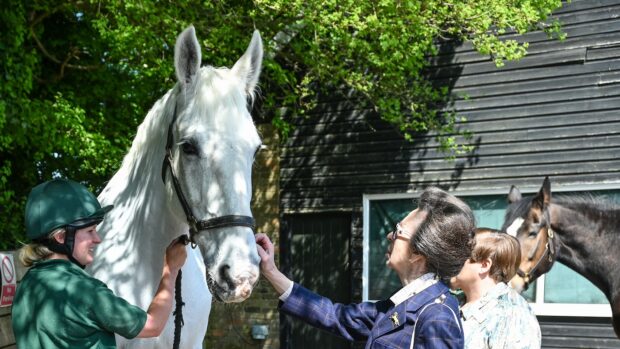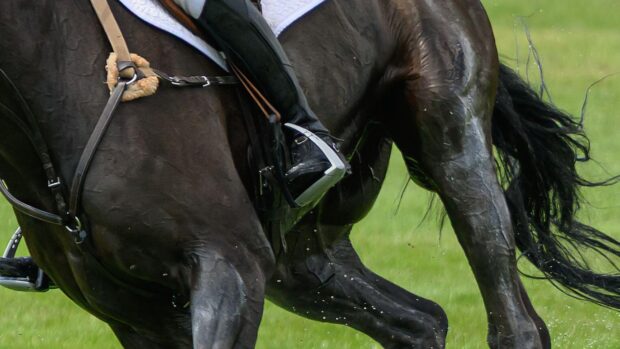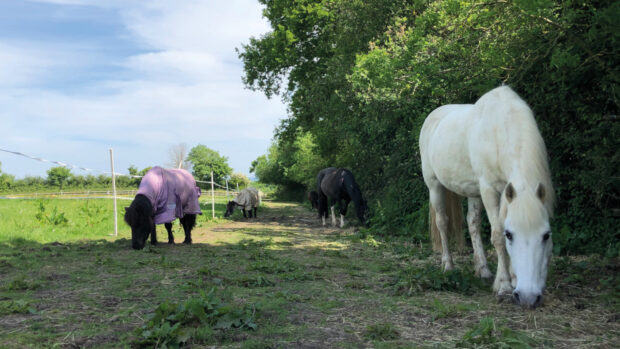WIDESPREAD treating of excess weight as a joke could be an important contributing factor to the obesity epidemic in horses, it is thought.
Experts discussed the issue, widely agreed to be one of the biggest welfare concerns facing the UK equine herd, at a Showing Council webinar on 20 January.
Researcher Tamzin Furtado, whose PhD was on equine obesity and owner attitudes to it, and Horse Trust director of research and policy Jan Rogers spoke about their work in the area. H&H has reported how their awards for the animals in the healthiest condition, which started as a pilot at small shows, was rolled out to the Royal International Horse Show last year.
“Why do we care about obesity?” Dr Furtado asked. “I wish I had a pound for every time someone’s said, ‘How can yours be a full-time job? They just need to work more and eat less.’ You probably know it’s a bit more complex than that but it’s a problem we’ve got to sort out.
“It was summed up for me by one vet who said he had had to put to sleep more horses from obesity-related disease in the past 10 years than from any other factor, and every one of those was preventable.
“So people think it’s not a big deal, but it is life or death.”
Dr Furtado said, as H&H has previously reported, that our horses live in an obesogenic environment; one in which it is likely they will gain weight, for reasons including mild winters, wet summers with much grass growth, and more horses tending towards being pets rather than working animals, so fewer people are used to seeing fit, appropriately exercised animals.
But she added that another “big reason”, she thinks, is that in many Western countries, obesity in animals, “and, I’m sad to say, children”, is seen as funny.
“If you Google ‘fat horse’ you’ll find loads of memes,” she said. “I think the fact we joke about it, and the language used like ‘cuddly’, ‘looking well’ is positive and sometimes funny, it minimises the severity of the problem.”
Ms Rogers spoke of the condition awards scheme, which is to run at some 40 shows this year, publicised by he hashtag #TheWeighToWin. She said the aim is to reward positives rather than penalise, adding that The Horse Trust is looking into human behaviour-change science to help bring about change in this area, using the principle of “little nudges rather than the revolution”.
“Fundamentally our values are all the same; we care about the wellbeing of the horse,” she said. “It could be a bumpy road but we’ll be driving slowly; we want to understand what people believe, and what their drivers are, to bring about positive change.”
The importance of young horses’ weight being kept under control was discussed, owing to its long-term potential for harm, and the setting up of working groups to help judges, for example when determining if a healthy-weight horse with a minor conformational defect should be placed above an obese one with better basic conformation.
Vet and Showing Council chairman Jane Nixon said: “I think this is what judges really need to be taught. Which conformational faults are the most serious for each breed or discipline, and how serious is obesity. At the end of the day, an obese horse will stand less work than one with a minor defect. I think a lot of discussion at judges’ seminars would help.”
Dr Nixon added: “If you want your horse to have a good long life, don’t make him overweight when he’s a baby, or I promise that by the time he’s eight, he’ll be sub-clinically lame, and if he’s obese between birth and two, by the time he’s 10, he’ll be clinically lame. It’s as serious as that.”
Dr Furtado said: “This is an epidemic and we have to find some way of sorting it out.”
You might also be interested in:

Concerns over showing judges’ ability to identify overweight and obese horses

Working together key in fight against fatal equine obesity

Major show gives signs of hope in battle against equine obesity

Subscribe to Horse & Hound magazine today – and enjoy unlimited website access all year round
Horse & Hound magazine, out every Thursday, is packed with all the latest news and reports, as well as interviews, specials, nostalgia, vet and training advice. Find how you can enjoy the magazine delivered to your door every week, plus options to upgrade your subscription to access our online service that brings you breaking news and reports as well as other benefits.



